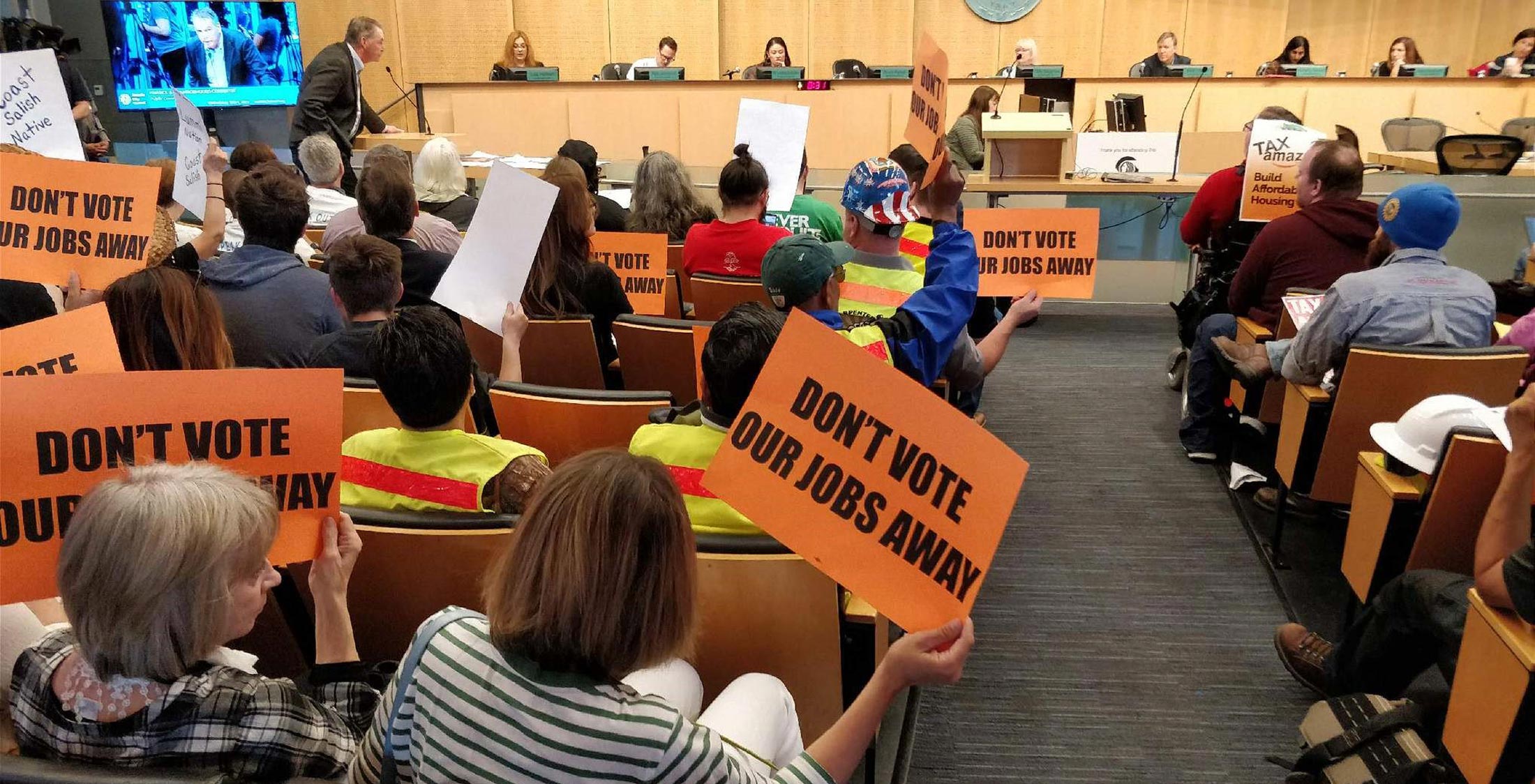A coalition of businesses formally began a campaign Friday to overturn Seattle’s just-passed head tax through a citizen referendum, opening a new phase in the city’s contentious debate about the homelessness crisis and what to do about it.
“We have until June 15 to gather 17,632 good signatures to send this to the ballot in November to give Seattle a referendum on this issue and, I think even more so, on the Seattle council,” said Saul Spady, president of an advertising company and grandson of Dick Spady, founder of Dick’s Drive-In.
On Monday, the Seattle City Council unanimously approved a yearly tax of $275 per full-time employee to be levied on businesses with at least $20 million annually in Seattle revenue, beginning next year.
The $47 million to $50 million expected to be raised by the tax each year would be used to fund new low-income housing and homelessness services under a nonbinding resolution the council passed at the same time as the tax. Actual spending decisions would be made as part of the city budget process in the fall.
To qualify for the fall ballot, backers of the referendum will need to gather valid signatures of 17,632 registered Seattle voters — 8 percent of the turnout in the last mayoral election — within 29 days of the effective date of the ordinance, according to the City Clerk’s office. Mayor Jenny Durkan signed the ordinance Wednesday. If the referendum gets enough signatures, the city council must place it on the next scheduled election ballot. A primary election is scheduled for Aug. 7, though the deadline to place measures on the ballot for that was May 11. The next general election is Nov. 6, when voters will already be presented with a property tax levy to fund education.
Supporters of the tax called for businesses to abandon the referendum attempt.
“Seattle’s exploding homeless population is a symptom of our city’s extraordinary economic growth and astronomical home prices,” said SEIU Healthcare 1199NW, a union representing health-care and behavioral-health workers, many of whom work directly with people experiencing homelessness. “The corporations who are profiting most — the top 3 percent — should rightfully pay a fair fee to address the problems they create.”
At least 585 companies would face the tax, based on city tax receipts from 2016, including profitable technology and professional-services firms and low-margin grocery stores.
City Council members and Durkan did not return requests for comment late Friday.
Cities including Lynnwood, Kirkland, Redmond and Vancouver charge per-employee fees — de facto head taxes — as part of their city business licenses. Lynnwood charges $93 a year for each employee working 15 hours or more a week. Kirkland charges $105 per full-time employee.
Mullet said he has support for his proposal from Republicans. “I need to find some more Democrat supporters,” Mullet said.
He said he also favors more state funding for affordable housing and is optimistic that “the political will is there to make those investments.”
Businesses and some Seattle residents have bristled at the tax, calling it a job killer and questioning the efficiency of the city’s past spending on homelessness programs.
The effort is supported by an “incredibly diverse mix of individuals, small businesses and large businesses across all sectors of Seattle,” Spady said, though he declined to disclose specific names beyond his own firm, Cr8tive Empowerment, and Dick’s, which is owned by members of his family, but which he does not own directly.
James Sido, spokesman for the Downtown Seattle Association, said the organization remains firmly opposed to the tax. “We’re hearing very strong interest from our membership regarding a referendum,” he said.
The Seattle Times editorial board on Wednesday called for a referendum to repeal the head tax, but the newspaper’s president, Alan Fisco, said the company has not contributed financial support for the referendum, nor does it plan to.
The campaign ensures the fight over how to respond to the homelessness emergency declared by city and King County leaders in 2015 will continue.
Homelessness in King County has risen nearly 23 percent since 2014 to total nearly 12,000 people at the last point-in-time count, including a huge increase in people sleeping outside. Results of a 2018 count of homelessness are expected at the end of May.
Business groups immediately opposed the measure, but it was Amazon that ignited a business backlash to the vote with the retailer’s statement early this month that it would pause some construction planning pending the outcome of the vote.
Durkan, who had indicated she would veto a larger tax of $500 a head, worked out a compromise with council members last weekend that cut the tax to $275 and set an expiration date of 2023 unless the City Council voted to renew it.
Amazon said after the vote that it would continue construction on one building it had paused during City Council deliberations, but is apprehensive about future growth in Seattle and continues evaluating options for another building it had committed to leasing.
Amazon did not respond to a request for comment on the referendum Friday.
